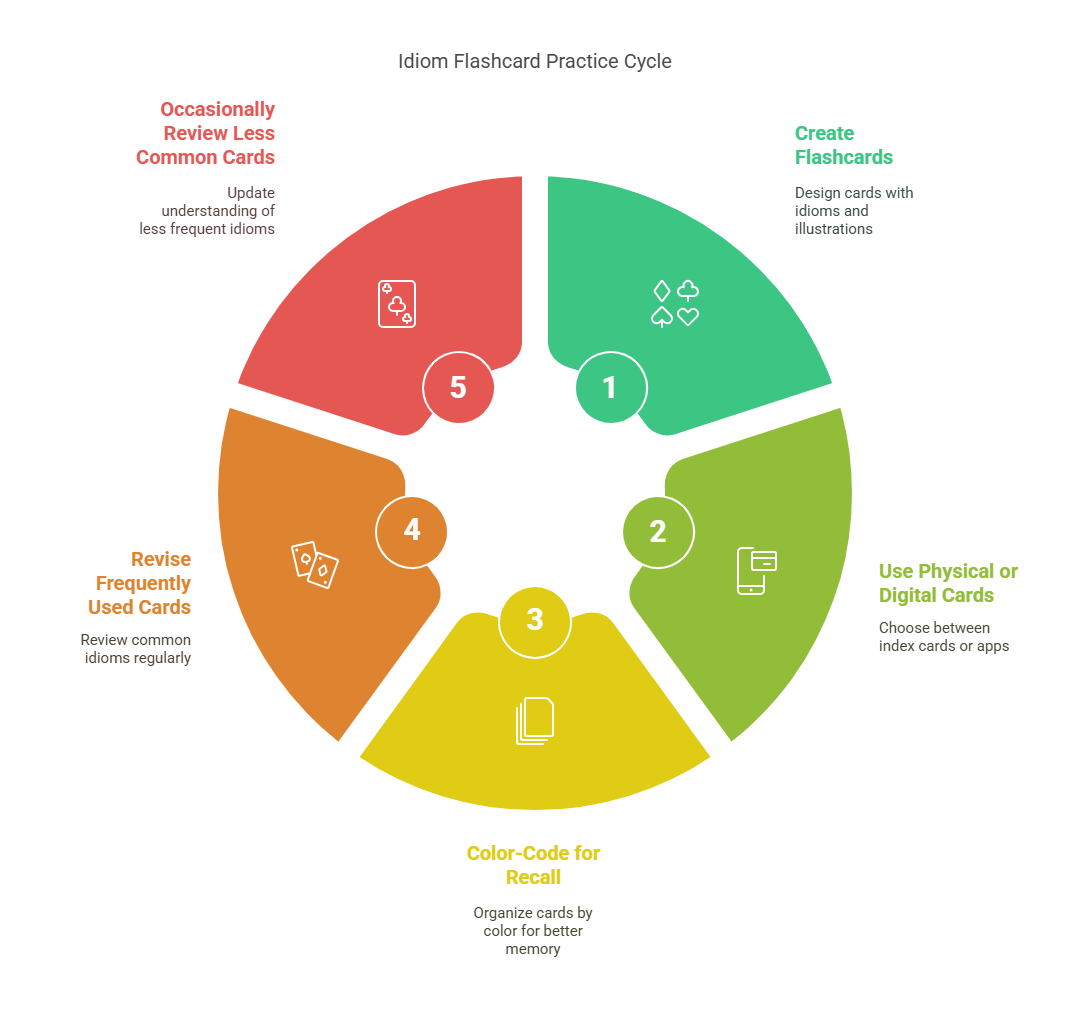Table of Contents
Do you find it challenging to use idioms naturally in your IELTS Speaking test? Idioms are essential in IELTS speaking test as they improve your Lexical Resource score. However, learning idioms without understanding their meaning and context can lead to a reduction in score. Idioms can be learned by integrating them into daily practice through conversation, role-plays, and digital tools. In this article, let us explore how to practice idioms for IELTS speaking at home effectively, avoid common mistakes, and make them a natural part of your English communication.
Master the IELTS Exam with Online Coaching – Enroll Today!
How to Learn Idioms Effectively?
Idioms must be used correctly and naturally to avoid sounding forced and creating confusion. Here is a guide on how you can learn idioms and use them effectively:
Start with Common Idioms:
Numerous idioms are commonly used in IELTS speaking test. Start by learning these idioms as they are simple and easy to understand. Some of the common idioms are:
- A blessing in disguise: Something that seems bad, but turns out good. Example: Losing my job was a blessing in disguise because I found a better one.
- Call it a day: Stop working for the day. Example: We’ve done enough. Let’s call it a day.
- Go the extra mile: To put in extra effort. Example: I decided to go the extra mile to learn English.
- Make up your mind: To decide. Example: I can’t make up my mind about which dress to wear.
- Keep an eye on: To watch carefully. Example: Keep an eye on your valuables in crowded places.
Categorize Idioms by Topic
Idioms can be categorized based on their meaning, usage, origin, or grammatical structure. Here are some common ways to classify them:
Based on Meaning or Theme
- Animal Idioms – “Let the cat out of the bag” (Reveal a secret)
- Food Idioms – “Piece of cake” (Something easy)
- Weather Idioms – “Under the weather” (Feeling sick)
- Color Idioms – “Caught red-handed” (Caught in the act)
- Money Idioms – “Break the bank” (Too expensive)
- Body Idioms – “Cold feet” (Nervous)
- Learning – “Hit the books” (To study hard)
- Knowledge – “Put on your thinking cap” (To think carefully about something)
- Exams and Results – “Pass with flying colours” (To succeed with a high score)
- Technology -“Cutting edge” (The most advanced technology)
- Digital life- “Go viral” (To spread quickly online)
- Connectivity – “On the same wavelength” (Understanding each other well)
- Sports Idioms – “Hit it out of the park” (Do something exceptionally well)
IELTS speaking topics are based on various themes, so practice grouping idioms by common IELTS themes.
Use Authentic Resources
Learning idioms in context helps you understand their meaning and apply them effectively. Using authentic resources throws light on how idioms are used in real-life contexts. Watching English movies and sitcoms (e.g., Friends, Sherlock), listening to English podcasts (e.g., BBC Learning English), and reading novels and magazines are a great way to learn idioms effectively.
Practical Ways to Practice Idioms at Home
1: Most university students ........................ on campus in their first year.
Practicing idioms helps improve fluency and makes you sound more natural and confident. Below are different ways to practice idioms for IELTS speaking at home:
Create Idiom Flashcards
Flashcards are visual aids that enhance memory retention. They should have idioms on the front side, and their meanings and examples on the back side. A small illustration or mnemonic will help reinforce the meaning. You can create physical cards using index cards or digital ones using apps like Anki, Canva or Quizlet.
The flashcards can also be color-coded for better recall. Revise the frequently used ones more often and less common ones occasionally.
Practice with Sample IELTS Questions
There are ample IELTS-speaking topics all over the internet. Practice using those topics and record yourself to analyze your fluency. Incorporate idioms and speak naturally to add flair to your speech. Review your mistakes and work on your weak areas. Take a look at a sample response:
Topic: Talk about a hobby that you enjoy
One hobby that I truly enjoy is reading books. I have been reading since the age of 3, and I find it very relaxing. I got hooked on books with pictures and since then I’ve been devouring books left and right.
Reading helps me explore different cultures and ideas and improves my vocabulary and communication skills. I enjoy books of various genres, from fiction to autobiography.
I read for at least one hour every day, before bedtime as it helps me unwind after a long day. Whenever I get stressed, I curl up with a book. It helps me recharge my batteries.
Idioms used:
- Unwind after a long day – to relax after a busy or stressful day
- Recharge my batteries – regain energy
Role-Playing Conversations
Role-play conversations helps improve confidence, fluency, and spontaneity. It also helps reduce anxiety and stress, work on intonation, and make speech more engaging. Practice with a speaking partner, maybe a friend, teacher, or an online buddy. At Entri, you get mentor support for real-time practice.
Speaker 1: I love this dress, but it’s too expensive.
Speaker 2: Don’t break the bank for it. Wait for a sale.
Speaker 1: Yeah, I’ll keep an eye out for discounts.
Idioms used:
Break the bank- Spend too much money
Keep an eye out – Watch for something
Write Idiom-Based Stories
Writing short stories using idioms helps learn them in context and becomes easier to remember. It helps get a better understanding of the idioms and use them naturally like native speakers.
To write idiom-based stories, pick an IELTS theme and a couple of idioms related to that theme. Write a short story incorporating 2 or 3 of those idioms naturally.
Use Idioms in Daily Life
Using idioms in everyday conversations can make your speech more fluent and expressive. Use idioms when talking to friends, family, colleagues, or even oneself. Learn idioms for movies and TV shows and try applying them in your conversations.
Ace Your IELTS Exam with Confidence!
Unlock your potential with our expert-led IELTS preparation course. Achieve your dream score and open doors to global opportunities!
Start Your IELTS Journey Today!Common Mistakes to Avoid When Using Idioms
Using idioms correctly can make you sound natural, but misusing them can lead to confusion. Here are some common mistakes to avoid:
- Using idioms incorrectly: Only use the idioms you fully understand. This prevents you from sounding unnatural.
- Overusing idioms: Do not overload you answers with too many idioms. Use only one or two idioms per topic.
- Translating idioms from your native language.
- Memorizing idioms: Instead of memorizing idioms, learn them through practice and real conversations.
- Using idioms in the wrong context: This can lead to confusion and lower your score.
Tools and Resources for Practicing Idioms
Practicing idioms requires a mix of listening, reading, writing, and speaking exercises. Here are some of the best tools and resources to help you practice idioms:
Online Tools:
- The Free Dictionary (Idioms Section) – idioms.thefreedictionary.com
- Cambridge Dictionary (Idioms) – dictionary.cambridge.org
- BBC Learning English (The English We Speak) – www.bbc.co.uk/learningenglish
- IdiomSite – www.idiomsite.com
- Entri App – https://entri.app/
Books:
- Oxford Dictionary of English Idioms
- Idioms for IELTS Speaking by Julie Moore
- English Idioms in Use (Cambridge)
YouTube Channels & Podcasts:
- BBC Learning English
- English Addict with Mr. Steve
- Speak English with Vanessa
Conclusion
Idioms are a valuable tool for improving your IELTS Speaking score, but they require regular practice. By learning idioms in context using the resources mentioned in this article, you can make your English more engaging and expressive.
The tips will help you practice idioms for IELTS speaking at home by focusing on correct usage, context, and pronunciation rather than just memorizing them. Mastering idioms using these tips will give you the confidence to communicate effectively.










